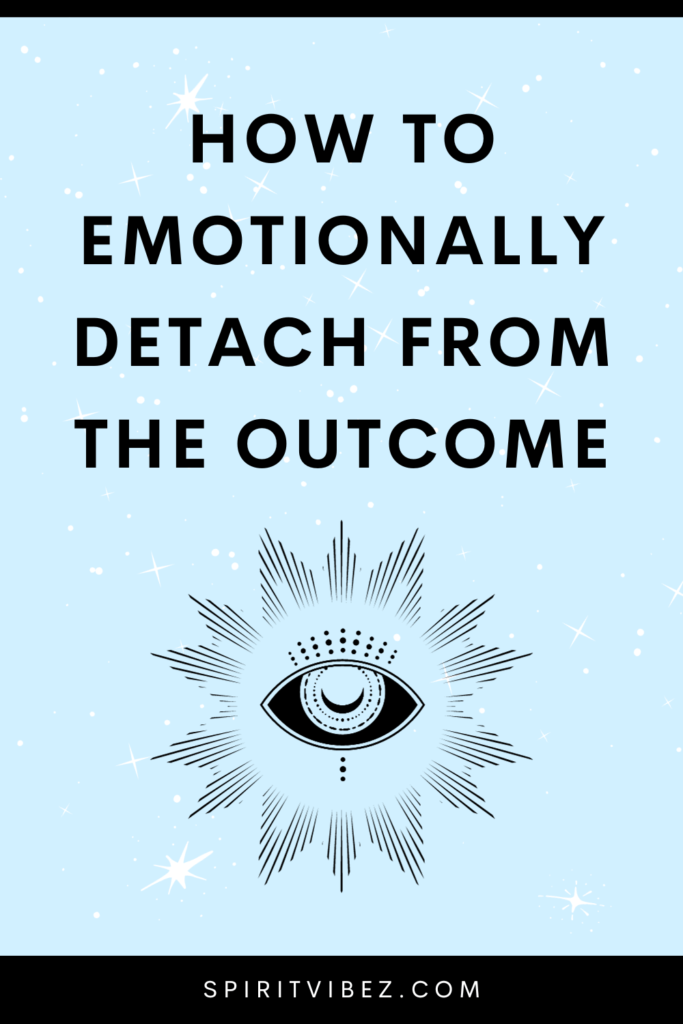Last Updated on January 6, 2024

Have you ever found yourself entangled in the web of expectations, anxiously clinging to the outcome of every endeavor as if your happiness depended solely on it?
In a world that often measures success by end results, the pursuit of detachment from outcomes becomes a compelling journey.
Imagine a life where the weight of expectations lifts, and you find solace in the process rather than fixating on the destination.
In this article, you’ll learn how to emotionally detach from the outcome, providing insights and practical strategies to liberate yourself from the grip of outcomes and embrace the beauty of the journey itself.
Why is it important to detach?
Detachment is crucial for mental and emotional well-being, offering a profound impact on personal growth and resilience.
By cultivating the ability to distance oneself emotionally from situations, you can navigate challenges with a balanced perspective. This resilience not only aids in stress management but also enhances decision-making by preventing emotional turbulence from clouding rational thinking.
Detachment’s significance extends to personal growth by allowing you to release attachments to past experiences or limiting beliefs. This opens doors to new possibilities, fostering evolution and expansion beyond self-imposed boundaries.
Ultimately, detachment contributes to inner peace by accepting the uncontrollable aspects of life.
How to emotionally detach from the outcome
Emotionally detaching from the outcome is a transformative skill that can liberate you from the grip of anxiety, disappointment, and stress.
Whether you’re navigating the unpredictable twists of life or striving for a particular goal, the ability to detach emotionally from the outcome empowers you to maintain inner peace and resilience.
Here are some practical steps to help you master the art of emotional detachment:
1. Clarify your intentions
Before embarking on any journey, clearly define your intentions. Ask yourself why the outcome matters to you and what achieving it would bring into your life.
This self-awareness allows you to separate your goals from your identity and recognize the underlying motives driving your desires.
2. Focus on the process, not just the result
Shift your attention from the end goal to the journey itself. Embrace the process, savor the small victories, and find joy in the day-to-day efforts.
By immersing yourself in the present moment, you create a buffer against the emotional rollercoaster that can accompany attachment to outcomes.
3. Cultivate mindfulness
Practice mindfulness to anchor yourself in the present. Meditation, deep breathing, or simple awareness exercises can help you observe your thoughts and emotions without being swept away by them.
Mindfulness builds resilience and enables you to respond to situations with clarity rather than reacting impulsively.
4. Accept uncertainty
Life is inherently uncertain, and outcomes are often beyond our control. Embrace this truth and accept that not everything will go as planned.
By acknowledging the unpredictability of life, you free yourself from the burden of unrealistic expectations.
5. Detach your self-worth from outcomes
Your value as an individual is not determined solely by your achievements or failures. Separate your self-worth from external outcomes, recognizing that you are inherently valuable irrespective of the results of your endeavors.
6. Challenge negative thoughts
Actively challenge and reframe negative thoughts related to outcomes. Instead of catastrophizing or dwelling on worst-case scenarios, focus on more balanced and realistic perspectives.
This shift in mindset can significantly reduce the emotional weight attached to specific results.
7. Develop a growth mindset
Embrace a growth mindset that sees challenges as opportunities for learning and growth. View setbacks as stepping stones toward improvement rather than as indicators of personal inadequacy.
This mindset fosters resilience and minimizes the emotional impact of setbacks.
8. Create a support system
Surround yourself with a supportive network of friends, family, or mentors. Sharing your thoughts and concerns with others can provide valuable insights, encouragement, and a fresh perspective, helping you maintain emotional balance.
9. Practice self-compassion
Treat yourself with the same kindness and understanding you would offer a friend. Understand that it’s okay not to have all the answers or to face occasional setbacks.
Self-compassion allows you to bounce back from challenges with greater emotional resilience.
10. Celebrate the journey
Acknowledge and celebrate your progress, irrespective of the final outcome. By recognizing and appreciating the efforts you put into your endeavors, you cultivate a positive mindset that is less dependent on external validation.
Incorporating these strategies into your daily life can gradually help you develop a healthier relationship with outcomes.
Remember, the journey of emotional detachment is a continuous process, and each step you take brings you closer to a more serene and empowered existence.
If you enjoyed this article on how to emotionally detach from the outcome, I would be grateful if you shared it on Twitter, Facebook, or Pinterest! Thank you❤️
📌 PIN THIS POST FOR LATER


Hello, my name is Sara and I am the founder of Spiritvibez, I’m here to guide you on your spiritual journey toward healing, growth, and self-discovery. I believe that true transformation occurs when the mind, body, and spirit are aligned and working in harmony. Through Spiritvibez, I hope to inspire and empower you to deepen your spiritual practice, embrace your authentic self, and begin living your best life.

This was interesting